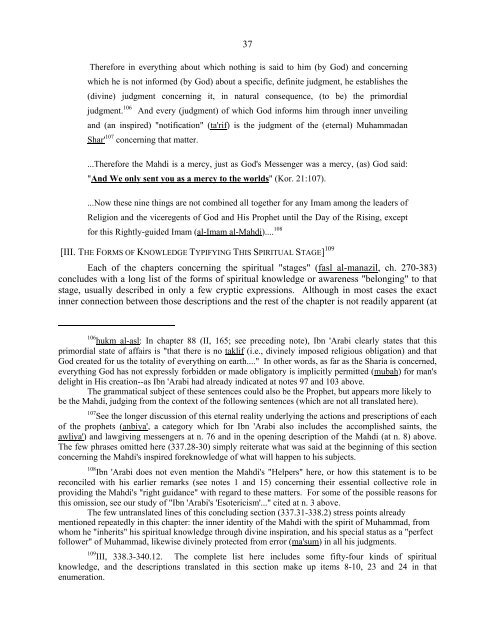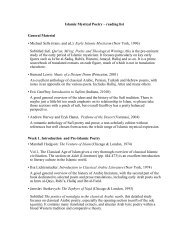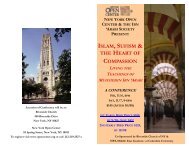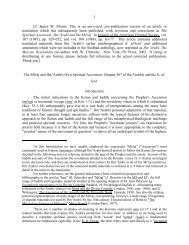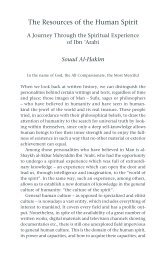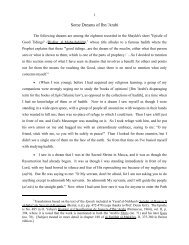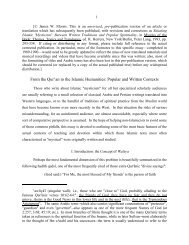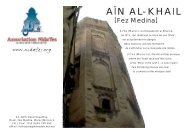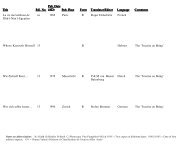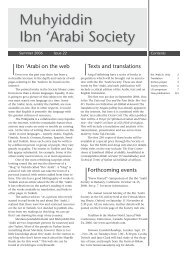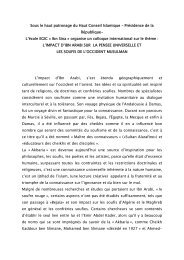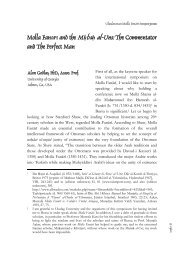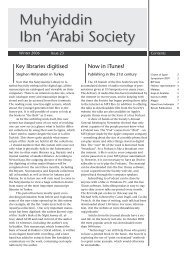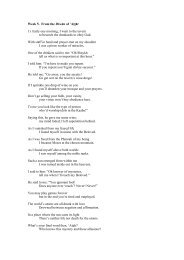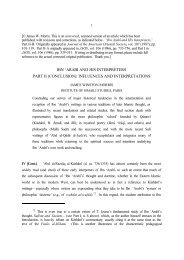The Mahdi and His Helpers - Muhyiddin Ibn Arabi Society
The Mahdi and His Helpers - Muhyiddin Ibn Arabi Society
The Mahdi and His Helpers - Muhyiddin Ibn Arabi Society
You also want an ePaper? Increase the reach of your titles
YUMPU automatically turns print PDFs into web optimized ePapers that Google loves.
37<strong>The</strong>refore in everything about which nothing is said to him (by God) <strong>and</strong> concerningwhich he is not informed (by God) about a specific, definite judgment, he establishes the(divine) judgment concerning it, in natural consequence, (to be) the primordialjudgment. 106 And every (judgment) of which God informs him through inner unveiling<strong>and</strong> (an inspired) "notification" (ta'rif) is the judgment of the (eternal) MuhammadanShar' 107 concerning that matter....<strong>The</strong>refore the <strong>Mahdi</strong> is a mercy, just as God's Messenger was a mercy, (as) God said:"And We only sent you as a mercy to the worlds" (Kor. 21:107)....Now these nine things are not combined all together for any Imam among the leaders ofReligion <strong>and</strong> the viceregents of God <strong>and</strong> <strong>His</strong> Prophet until the Day of the Rising, exceptfor this Rightly-guided Imam (al-Imam al-<strong>Mahdi</strong>).... 108[III. THE FORMS OF KNOWLEDGE TYPIFYING THIS SPIRITUAL STAGE] 109Each of the chapters concerning the spiritual "stages" (fasl al-manazil, ch. 270-383)concludes with a long list of the forms of spiritual knowledge or awareness "belonging" to thatstage, usually described in only a few cryptic expressions. Although in most cases the exactinner connection between those descriptions <strong>and</strong> the rest of the chapter is not readily apparent (at106 hukm al-asl: In chapter 88 (II, 165; see preceding note), <strong>Ibn</strong> '<strong>Arabi</strong> clearly states that thisprimordial state of affairs is "that there is no taklif (i.e., divinely imposed religious obligation) <strong>and</strong> thatGod created for us the totality of everything on earth...." In other words, as far as the Sharia is concerned,everything God has not expressly forbidden or made obligatory is implicitly permitted (mubah) for man'sdelight in <strong>His</strong> creation--as <strong>Ibn</strong> '<strong>Arabi</strong> had already indicated at notes 97 <strong>and</strong> 103 above.<strong>The</strong> grammatical subject of these sentences could also be the Prophet, but appears more likely tobe the <strong>Mahdi</strong>, judging from the context of the following sentences (which are not all translated here).107 See the longer discussion of this eternal reality underlying the actions <strong>and</strong> prescriptions of eachof the prophets (anbiya', a category which for <strong>Ibn</strong> '<strong>Arabi</strong> also includes the accomplished saints, theawliya') <strong>and</strong> lawgiving messengers at n. 76 <strong>and</strong> in the opening description of the <strong>Mahdi</strong> (at n. 8) above.<strong>The</strong> few phrases omitted here (337.28-30) simply reiterate what was said at the beginning of this sectionconcerning the <strong>Mahdi</strong>'s inspired foreknowledge of what will happen to his subjects.108 <strong>Ibn</strong> '<strong>Arabi</strong> does not even mention the <strong>Mahdi</strong>'s "<strong>Helpers</strong>" here, or how this statement is to bereconciled with his earlier remarks (see notes 1 <strong>and</strong> 15) concerning their essential collective role inproviding the <strong>Mahdi</strong>'s "right guidance" with regard to these matters. For some of the possible reasons forthis omission, see our study of "<strong>Ibn</strong> '<strong>Arabi</strong>'s 'Esotericism'..." cited at n. 3 above.<strong>The</strong> few untranslated lines of this concluding section (337.31-338.2) stress points alreadymentioned repeatedly in this chapter: the inner identity of the <strong>Mahdi</strong> with the spirit of Muhammad, fromwhom he "inherits" his spiritual knowledge through divine inspiration, <strong>and</strong> his special status as a "perfectfollower" of Muhammad, likewise divinely protected from error (ma'sum) in all his judgments.109 III, 338.3-340.12. <strong>The</strong> complete list here includes some fifty-four kinds of spiritualknowledge, <strong>and</strong> the descriptions translated in this section make up items 8-10, 23 <strong>and</strong> 24 in thatenumeration.


